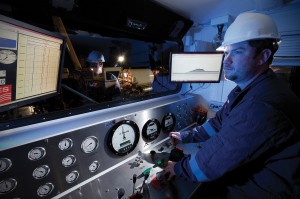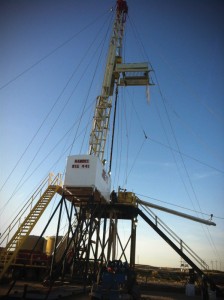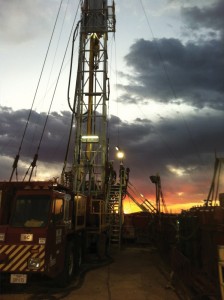It is not surprising that well service companies consider hiring and housing as two of their top issues, as oil prices continue parked at just under $100 per barrel. The words used to relate the topic do open the eyes a bit.
“Theft” was how Rich Fontenot described it. Fontenot, senior sales representative for Nabors Well Services’ Permian Basin office, added that, “on the workover rig side, we’re going to have to increase salaries there” to keep their best people from being recruited by other well service companies.
Raising pay creates a squeeze for Nabors because, he noted, “We haven’t been able to go up on rates.” Unusually low natural gas prices have caused a number of operators to reduce their presence in strong gas plays like Ft. Worth’s Barnett Shale, sending those rigs to the Permian Basin, which means well service companies in those affected regions have followed suit. This influx of competitors into the Permian has kept established companies like Nabors from being able to raise rates in order to cover higher costs.
Nabors itself has moved more resources to the Basin, especially hot oilers and pump trucks. As a Canadian company with multiple offices across its home country and the United States, it has plenty of resources to draw from.
To accommodate the growth of business, Nabors is opening a fishing tool yard at 3400 Mankins Avenue in Odessa, which would give the company four yards in the Permian Basin. Fontenot estimated that the new yard would be opened sometime this spring.
Along those same lines, Key Energy listed availability of talent and assets as issues for them, along with new technology and regulatory issues as influences on their pricing, agreeing with Nabors that competition levels are also a concern. Without stating any numbers, Key’s Vice President of Investor Relations, Gary Russell, said they strive to “get a reasonable price for the value we deliver to our customers.”
Key is dealing with its need for equipment as Nabors is—by bringing machinery from elsewhere. But Key also relies on its Technology Center, a manufacturing facility in the area, to deliver needed equipment.
Both companies addressed the issue of attracting new talent to combat the “graying” of the industry. Key focuses especially on bringing in new talent.
 Nabors’ Fontenot, a relative newcomer to the area and the industry himself, has used personal contacts to recruit friends to come from east and central Texas to work in the oil patch. Fontenot came to Midland about two years ago, having previously worked in education.
Nabors’ Fontenot, a relative newcomer to the area and the industry himself, has used personal contacts to recruit friends to come from east and central Texas to work in the oil patch. Fontenot came to Midland about two years ago, having previously worked in education.
This company also finds itself confronted with the possible retirement of a number of field people—employees with 25-30 years experience on average—in the near future. Fontenot joked that Nabors’ management is trying to convince those individuals to stay on for a few more years, “until the next downturn hits a little bit.”
Closely related to the challenge of hiring and keeping personnel is the question of living quarters for anyone new to the area. Affordability of housing hits hard at everyone, old and new. “We’ve got people paying $1,300-$1,400 a month for a one-bedroom,” Fontenot related. “But we’ve tackled those issues by putting in man-camps in remote areas like Crane and Pecos.”
One industry expert recently stated that he saw the Basin becoming “deeper and wider.” Economic strength and technological growth have allowed drilling to go deeper than before, especially horizontally, and to reach additional plays like the Cline Shale and to regions like Borden County. As the drilling goes, so go the service companies.
“Horizontal drilling has absolutely changed the nature of some of the work in well servicing, including the equipment used and the talent required to execute the work,” said Key’s Russell. “In general, those wells require bigger, more capable equipment, particularly rigs and coiled tubing assets, as well as more transportation and storage requirements associated with larger overall fluid volumes.”
Nabors is also acquiring equipment suitable for working with coiled tubing and with the higher pressures involved.
And while Nabors is aware of interest in areas that are now outliers, including San Angelo, Fontenot feels it will be a few more months before their clients move there full-force. For Key, which calls the Basin “the gift that keeps on giving,” they also have clients excited about the new plays, with plans to take advantage of those opportunities soon.
 Over the next year, Russell feels “balance” will be the biggest challenge, not just for Key itself but for the Basin as a whole. “The same dynamics that impact our business—just one company of many—will impact others, too. The Permian’s groundedness with its spirit of hard work, family, community, and respect for the environment are difficult to duplicate elsewhere. I expect Key will continue to be a leader regarding all those important elements in the Permian Basin community,” Russell said.
Over the next year, Russell feels “balance” will be the biggest challenge, not just for Key itself but for the Basin as a whole. “The same dynamics that impact our business—just one company of many—will impact others, too. The Permian’s groundedness with its spirit of hard work, family, community, and respect for the environment are difficult to duplicate elsewhere. I expect Key will continue to be a leader regarding all those important elements in the Permian Basin community,” Russell said.
Finding and training qualified personnel may be the biggest challenge Nabors sees. While company men may balk at seeing “green hats” on the wellsite, Fontenot pointed out that everyone starts out that way, and without new people, the job doesn’t get done.
Nabors is ramping up training, especially in the safety realm, for new guys. Each new hire is required to complete a two-week training school before being unleashed on a job.










